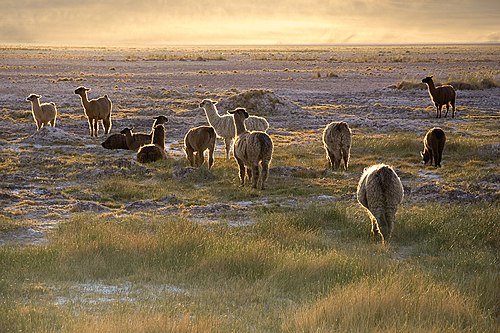Llamanoun
A South American mammal of the camel family, Lama glama, used as a domestic beast of burden and a source of wool and meat.
Llamanoun
A South American ruminant (Auchenia llama), allied to the camels, but much smaller and without a hump. It is supposed to be a domesticated variety of the guanaco. It was formerly much used as a beast of burden in the Andes, and is also kept on some ranches in the United States.
Llamanoun
The fleece of the llama{1}, a fine, soft wool-like hair.
Llamanoun
wild or domesticated South American cud-chewing animal related to camels but smaller and lacking a hump
Llamanoun
a domesticated pack animal of the camel family found in the Andes, valued for its soft woolly fleece.
Llamanoun
the wool of the llama.
Llamanoun
cloth made from the wool of the llama.
Llama
The llama (; Spanish pronunciation: [ˈʎama]) (Lama glama) is a domesticated South American camelid, widely used as a meat and pack animal by Andean cultures since the Pre-Columbian era. Llamas are very social animals and live with others as a herd.
Lamanoun
A master of Tibetan Buddhism.
Lamanoun
See Llama.
Lamanoun
In Tibet, Mongolia, etc., a priest or monk of the belief called Lamaism.
Lamanoun
a Tibetan or Mongolian priest of Lamaism
Lamanoun
llamas
Lamanoun
an honorific title applied to a spiritual leader in Tibetan Buddhism, whether a reincarnate lama or one who has earned the title in life.
Lamanoun
a Tibetan or Mongolian Buddhist monk.
Lama
Lama (Tibetan: བླ་མ་, Wylie: bla-ma; ) is a title for a teacher of the Dharma in Tibetan Buddhism. The name is similar to the Sanskrit term guru, meaning , endowed with qualities the student will eventually embody.

























